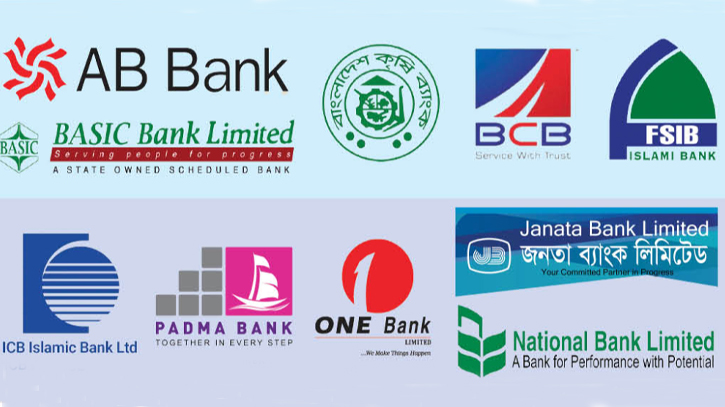
Photo: Messenger
Tougher times are ahead for ten banks identified as weak in the country’s banking sector. According to sources from several related government departments, including the central bank, the 10 weak banks declared by Bangladesh Bank have been instructed to improve their condition within one year. Otherwise, these banks will be merged with other competent banks, and in extreme cases, some may even face closure.
A trusted and responsible source within Bangladesh Bank informed The Daily Messenger on Tuesday that the central bank has taken a strict stance to restore order to the banking system. The concerned banks have already received the message regarding the strict instructions from the central bank, and information has been relayed to the Prime Minister’s office.
Despite repeated reminders, there has been no improvement in these weak banks, according to related sources. Extreme dissatisfaction has arisen at the highest levels of the government, including within the central bank itself. Consequently, the central bank is now poised to take strict actions against them.
It is learned that discussions have been held with Prime Minister Sheikh Hasina to decide on the fate of these banks. The Prime Minister has instructed Bangladesh Bank to give these banks one more year to improve their conditions.
Regarding this matter, Ahsan H. Mansur, the executive director of the Policy Research Institute (PRI), told The Daily Messenger, “The decision to shut down these banks would be very detrimental. Instead, the boards of these banks should be changed. Additionally, 4-5 banks should be closely monitored without a one-year grace period. Banks with potential for improvement should be given the opportunity to do so.”
He also mentioned that all banks cannot be viewed in the same light. Among them, there are some whose condition is not good, and some that could improve with a little nurturing. They should be given a chance. However, those that are unlikely to improve, or are not in a condition to do so, should not be allowed to waste a year.
“At this moment, it is necessary to change the boards of directors of these banks and form new ones. Otherwise, what remains of these banks will be mixed with dust within a year. In this scenario, these weak banks should be prevented from issuing loans and collecting new deposits. Otherwise, they will loot everything in the name of loans. By taking these actions, the banks will further endanger the government,” he added.
Previously, Bangladesh Bank identified 10 weak banks based on four factors: classified loans, capital adequacy, loan-deposit ratio, and provisioning or security reserves. At that time, Bangladesh Bank Governor Abdur Rouf Talukder confirmed the identification of these 10 weak banks without disclosing their names. However, their names were later revealed by the media.
The 10 banks identified as weak are - National Bank, Bangladesh Krishi Bank, Basic Bank, Rajshahi Krishi Unnayan Bank, ICB Islamic Bank, Bangladesh Commerce Bank, Padma Bank, National Bank of Pakistan, AB Bank, and Janata Bank. Additionally, four more banks were added to this list in January 2023 due to various irregularities and loan scams. Bangladesh Bank has appointed observers and coordinators in 14 public and private banks to monitor lending irregularities.
Currently, there are coordinators in six banks and observers in eight banks. Observers appointed in the banks include state-owned Sonali, Janata, Rupali, Agrani, the specialized Bangladesh Krishi Bank, and private sector banks such as Islami Bank Bangladesh, ICB Islami, and First Security Islami Bank. Coordinators are present in AB Bank, ONE Bank, National Bank, Padma Bank, BASIC Bank, and Bangladesh Commerce Bank. Additionally, special scrutiny has been applied to the foreign National Bank of Pakistan due to major irregularities.
It is known that during the last bankers’ meeting, detailed discussions were held regarding the weak banks. The governor, deputy governor, and top executive officers of Bangladesh Bank attended the meeting.
An official present at the meeting, speaking on the condition of anonymity, told The Daily Messenger, “The irregularities that have persisted in the banks for so long will no longer be tolerated. Actions have already been taken in this regard, and weak banks may even face closure." He added, “Political pressure or influence will not be entertained. Whatever is in the best interest of the economy will be pursued.”
A senior official of Bangladesh Bank informed The Daily Messenger, “The regulatory body, Bangladesh Bank, will exert its maximum power to strengthen the economy from now on. A positive signal has been received from the head of the government in this regard, and work has already commenced. Bangladesh Bank Governor Abdur Rouf Talukder met the Prime Minister on Tuesday and learned about her decision regarding the 10 weak banks.”
This high-ranking official of Bangladesh Bank also said that the prime minister has granted the banks one more year. However, if they fail to improve their corporate governance, debt collection practices, address capital shortfalls, and resolve liquidity crises within this period, these banks may face closure.
In response to this, Dr. Zahid Hussain, the former chief economist of the World Bank’s Dhaka office, told The Daily Messenger, “Bangladesh Bank has indicated that they will decide based on certain indicators. The asset growth of these weak banks should be restricted. They should not be allowed to issue bonuses or increase the salaries of officers and employees. Moreover, they should not be permitted to pay cash dividends to new shareholders."
“These banks may be given a one-year opportunity, but they must be subjected to strict supervision. They should be brought under the Prompt Corrective Action (PCA) framework,” he concluded.
Messenger/Disha








